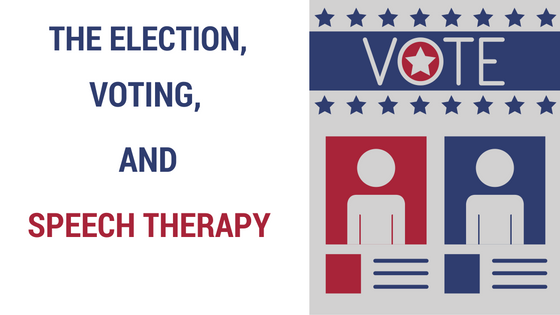With the midterm elections in the next month, it’s a perfect time of year to talk all things “Election,” “Voting,” and “Speech Therapy!”. Think you want to stay away from politics in your session? Consider this: These are the conversations our People are having this month! Voting may be an activity they hope to participate in, so why not target language and cognition using voting or the election? Increase the likelihood that your cognitive-communication practice will translate into real life improvement. Read on for ideas on how to use election topics to be person-centered and to target a variety of therapy goals.
*Honeycomb Speech Therapy update: In case you missed it on Facebook or Instagram, I had a baby this month! Things will be a little slow on my posts for the next few weeks, but I do have a few more planned posts coming for my Functional Treatment for Everyday Cognition Series!
In order to develop a person-centered goal, here are some items you want to know about your Person and the Election:
- “Are you planning to vote? Is there anything you are unsure of with the process of voting that we could practice in speech therapy?”
- “Do you like to talk politics with friends or family? Have you been able to do so in the way you want to?”
- “Have you had any changes with watching or reading the news to follow the election news?”
This information should help you know if your goal is to have better access to election/voting, better ways to comprehend, better ways to express in a certain situation, etc.
Election Resources
Here are some links to online resources that you could use for the sample therapy ideas below:
Your Local State Election Info: Here.
YouTube Video about the accessible ballot, AutoMARK: Here.
Sample Ballot (from 2012): Here.
 Sample Therapy Ideas:
Sample Therapy Ideas:
I hope these ideas are useful or help you easily target a person-centered goal! If you would like other ideas for meaningful, relevant activities to use in speech therapy, please check out my Back To Work and Home Sweet Home Series.
| To Target Strategies or Skills in This Area: | The Patient Could Do This: |
| Expression
(Verbal or Written) |
*Name or write candidate(s) or issues to talk about (CART?)
*Develop short Script to use at family dinner *Practice repair questions if there are difficulties while voting *Summarize a candidate’s view on a particular topic (with Response Elaboration Training?) *Generate a list of common political topics (Semantic Feature Analysis?) *Practice using a write-in ballot or requesting accessible ballot (AutoMARK) |
| Auditory Comprehension | *Follow xx-step directions to (find candidate info online, practice ballot directions, answer 2 questions about a key issue, etc)
*Use of breakdown/repair strategies *Use of writing notes to improve comprehension |
| Reading Comprehension | *Read ballot selections with use of strategies (highlight, underline, etc)
*Read short paragraph and summarize each candidate’s viewpoint on a certain topic |
| Motor Speech | *Challenge ability to carry-over motor speech strategy or skill while explaining candidate viewpoints, voting procedure, etc |
| Attention | *Sustain attention: Complete practice ballot with no needs for redirection
*Selective attention: In busy or noisy environment, complete practice ballot with no cueing from others *Use Step-By-Step Instruction to complete part of practice ballot or written summary, while also alternating between another task (answering a phone, explaining a different topic, etc). *Divide attention: While filling out ballot or writing a summary, listen for key information being announced and respond as needed (move rooms, etc) |
| Memory | *Spaced Retrieval: Recall facts or names for voting choices
*Prospective memory: Complete task on day or time as assigned *Use Task-Specific External Support to improve ability to (fill out a ballot / recall candidate selection / talk about key topics) *Short-term or new learning: Find new info on a candidate or topic and recall for xx-delay. |
| Thought Organization | *Use written instructions to improve speed of looking up news clips online
*Explain in 4 sentences your viewpoint on ****. *Summarize items needed for voting and process, in succinct steps. |
| Problem-Solving / Reasoning | *Use Goal Management Training to generate solutions for possible problems you could occur while (voting, discussing politics with family, etc)
*Practice how you would respond to someone who has a different political viewpoint from you |
| Executive Function | *Evaluate strategy success during task, or plan how to adapt strategies for new situation.
*Plan home program task that could be a similar challenge |
| Pragmatics | *Use appropriate turn taking in conversation
*Use a mood strategy if you get irritated or frustrated (take a deep breath, self-talk, etc) |
If you want more ideas of how to make your therapy functional and person-centered, check out my Store and lots of free ideas on the Idea Blog!
Make sure you get the latest functional therapy updates: “Like” Honeycomb Speech Therapy on Facebook, Instagram, or Pinterest, or sign up for email updates below.
References:
Hinckley, J., & Brice, A. (2016). Are your clients ready to vote? ASHA Leader, 21, 38-39. Online here.